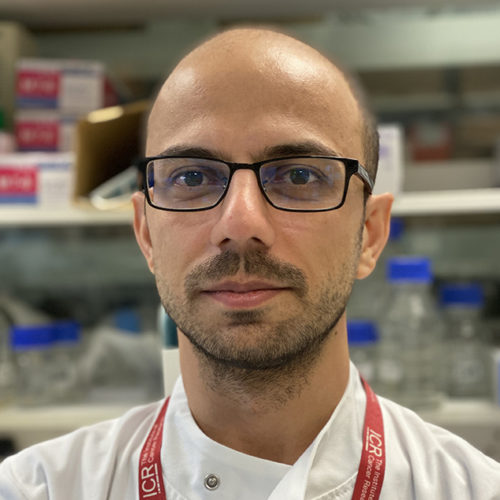Chromosomal Translocations and Intracellular Antibody Therapeutics
Professor Terry Rabbitts’ research is focussed on new strategies using intracellular antibodies and derivates for therapy aimed at hard-to-drug chromosomal translocation gene products.
Our research is focussed on new strategies for therapy aimed at hard-to-drug chromosomal translocation gene products.
Professor Terence Rabbitts
Group Leader:
Chromosomal Translocations and Intracellular Antibody Therapeutics
Professor Terence Rabbitts' research focuses on developing technologies using intracellular antibody fragments and small molecule derivatives, mainly aimed at targeting chromosomal translocation protein products.
Researchers in this group
 .
.
For my undergraduate, I studied Molecular Biology & Genetics at the Istanbul Technical University, Turkey, followed by my M.Sc. in Molecular Biology, Genetics and Bioengineering at Sabanci University, Turkey. During my M.Sc. programme, I investigated the regulation of autophagy through microRNAs, and developed a nanoparticle-based, microRNA-functionalised gene therapy system to target breast cancer cells. At the ICR, I study the mechanisms of selective autophagy.
Professor Terence Rabbitts's group have written 289 publications
Most recent new publication 9/2023
See all their publicationsWe are focussed on with new strategies for therapy aimed at chromosomal translocation gene products, like LMO2 and translocation protein fusions, and hard-to-drug proteins, like mutant RAS and MYC. We are developing technologies using intracellular antibodies with warheads (such as E3 ligase for protein degradation or pro-caspases for induced cell death) together with methods to allow systemic delivery of these protein macromolecules (designated macrodrugs). Our work has also recently shown that the binding sites of antibodies on target proteins can be used to select small molecule compounds that act as surrogates of the antibody for drug discovery.
Our approach is multi-disciplinary, integrating molecular biology, cell biology, antibody design, structural biology, and chemical biology. The long-term goal is creation of generic strategies for deploying intracellular antibodies are drugs per se and for using intracellular antibodies in small molecule drug discovery programmes. In particular, this work is aimed at allowing the many chromosomal translocation proteins, found in all cancers from leukaemia/lymphoma, sarcomas and carcinomas, to be used as drug targets in cancer treatment.
Additional information
Blog by Professor Terry Rabbitts on RAS-binding compounds
MRC Laboratory of Molecular Biology
Wikipedia article on Professor Terry Rabbitts
The first gene in the class, subsequently named the LIM Domain Only genes (LMO), was found as a transcribed region on human chromosome 11 band p15 near to a T cell acute leukaemia chromosomal translocation breakpoint. cDNA cloning showed a short coding region - initially designated RBTN1 or TTG1 (Boehm et al, 1988; McGuire et al, 1989) - that became known as LMO1.
There are three other members of this family, two of which (LMO2 and LMO3) are also adjacent to T cell acute leukaemia chromosomal translocation breakpoints. The fourth gene (LMO4) has no known association with translocations but has been implicated in breast cancer. Table 1 summarises the chromosomal locations and clinical associations of the LMO genes.
The LMO proteins are conserved in evolution and have two LIM domains, each comprising two LIM fingers co-ordinated by zinc atoms. These are not typical zinc fingers but rather are involved in a multi-protein transcription complex (Wadman et al, 1997). The LMO2 protein complex is the most well studied following initial characterisation and demonstration of the requirement for LMO2 in haematopoiesis (Warren et al, 1994). There is conservation of the orthologues and paralogues shown in the Tables.
References
Boehm, T., Baer, R., Lavenir, I., Forster, A., Waters, J.J., Nacheva, E., Rabbitts, T.H. (1988). The mechanism of chromosomal translocation t(,11;14) involving the T-cell receptor C delta locus on human chromosome 14g11 and a transcribed region of chromosome 11p15. EMBO J. 1988, 7, 385-94
McGuire, E.A., Hockett, R.D., Pollock, K.M., Bartholdi, M.F., O'Brien, S.J., Korsmeyer, S.J. (1989). The t(11;14)(p15;q11) in a T-cell acute lymphoblastic leukaemia cell line activates multiple transcripts, including Ttg-1, a gene encoding a potential zing finger protein. Mol Cell Biol. 1989, 9, 2124-32
Wadman, I.A., Osada, H., Grutz, G.G., Agulnick, A.D., Westphal, H., Forster, A. and Rabbitts, T.H. (1997). The LIM-only protein Lmo2 is a bridging molecule assembling an erythroid, DNA-binding complex which includes the TAL1, E47, GATA-1 and Ldb1/NLI proteins. EMBO J., 1997;16:3145-3157
Warren, A.J., Colledge, W.H., Carlton, M.B.L., Evans, M.J., Smith, A.J.H. and Rabbitts, T.H. (1994). The oncogenic cysteine-rich LIM domain protein rbtn2 is essential for erythroid development. Cell, 1994;78:45-58
Chambers, J., Rabbitts, T.H. (2015). LMO2 at 25 years: A paradigm of chromosomal translocation proteins. Open Biology 2015, 5, 150062